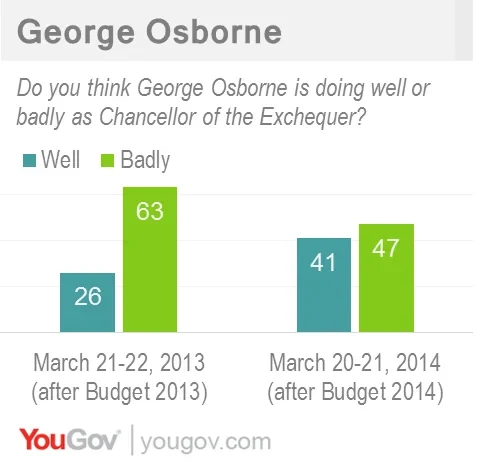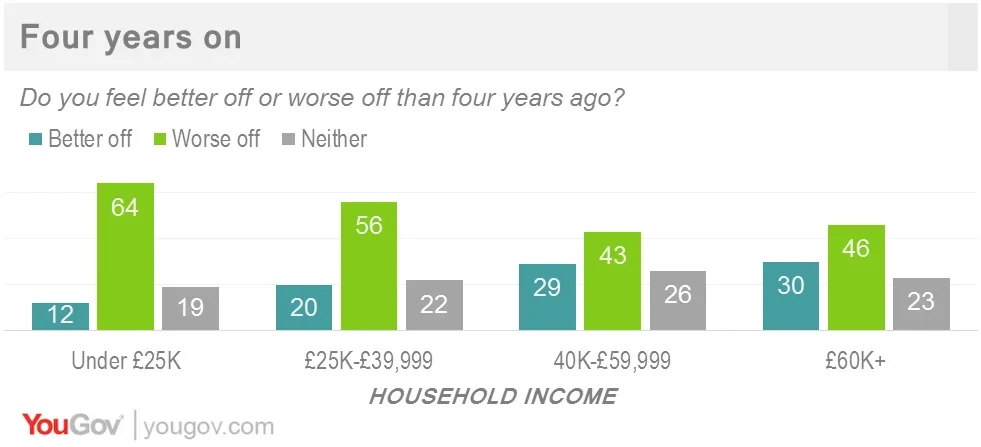YouGov President Peter Kellner: the Conservatives have scored a victory with this year's budget, but many voters still feel worse off than four years ago
Like a general securing a bridgehead on D-Day, George Osborne has secured his immediate objective. YouGov’s latest survey for the Sunday Times gives him and his Budget their highest marks since the earliest days of coalition harmony. No wonder Labour’s lead has crumbled to a single point.
It is too early to be sure whether our latest voting figures are a blip or a trend. Labour’s lead might well rise again as the news agenda moves on. But the public’s response to the Chancellor and his measures shows how the balance of forces on the biggest election battleground of all – the future of Britain’s economy – may have moved in the Conservatives’ favour.

After last year’s Budget, Osborne looked like a liability to the Tories. Only 26% thought he was doing well as Chancellor, while 63% viewed him as a failure. Now 41% say he is doing well and just 47% say badly. His net rating of minus six is not only better than that of any party leader today; it is better than that enjoyed by any party leader in the past two years.
On the wider issue of dealing with Britain’s deficit, the coalition enjoys a 13 point lead over Labour, up from seven last year. At a more personal level, few people think this year’s Budget is bad for them. Two years ago, 50% of voters feared that Osborne’s measures would dent their living standards. Last year the figure fell to 30%. This year it is just 22%.
In the short term, then, the Tories have cause to cheer. What about the longer term? Two of last week’s most eye-catching measures seem designed to appeal to two of the Tories’ most vital target groups. For more than twenty years , women under 40 have been drifting away from the Conservatives. That trend has accelerated since 2010, with mothers bearing the rising day-to-day costs of young families at a time when living standards generally have stalled.
Only 27% of women under 40 say they would vote Tory, compared with 34% of men under 40 and 36% of women over 40. The Chancellor must hope that help with child care costs will help to win over younger women voters.
Secondly, older men who voted Conservative in 2010 have been defecting to UKIP in terrifying numbers. They have most to gain in the next few years from Osborne’s radical changes to the pensions rules.
That said, the Chancellor is shrewd enough to know that voters choose their party for a host of reasons. Specific policies can help at the margin – and in a very tight contest can make the difference between victory and defeat. But the Tories need bigger shifts if they are to overturn Labour’s modest but persistent lead.
The best news for Osborne is to be found not in the latest YouGov polls but polls conducted at the same stage in past parliaments. Six times in the past half century Conservative prime ministers have faced the electorate. In every case the final 14 months produced a swing from Labour to Tory. The average swing has been 6%. In recent weeks, Labour’s lead has averaged 5%. If history repeats itself, we should expect a Tory lead on election day of 7%. This would make them easily the largest party; if they win enough seats back from the Lib Dems, they could be very close to an overall majority.
Indeed, if we take YouGov’s latest poll as our starting point, then a further 6% swing to the Conservatives would see them home with a 40-seat majority
The trouble is that history does not always repeat itself. And in two respects, things are bound to be different this time. For one thing the Liberal Democrats will be entering the election as coalition partners with their hands dirtied by the inevitable disappointments and compromises of power, not as a pristine party able to galvanise the forces of protest. For another thing, UKIP lurks in the wings, threatening to deprive the Tories of vital votes in the key marginals.
Moreover the Government remains vulnerable to the lethal question that Ronald Regan asked Americans in 1980 as he sought to wrest the presidency from Jimmy Carter: are you better or worse off than you were four years ago? In those households earning more than £40,000 a year, most Britons say ‘better’ or ‘about the same’. But in the 70% of households on less than £40,000 a year, six out of ten say worse off. The Tories need that figure to fall in the months ahead.

Which is why David Cameron and his Chancellor can’t simply assume that voters will come flocking back to the Tories regardless. Of course they want faster economic growth and rising living standards; but that’s not all. They must persuade enough people that they have administered the right medicine and will do nothing rash to jeopardise recovery.
Had Osborne delivered tax cuts last week, initial electoral gratitude might have turned into complaints that he was offering a cynical pre-election bribe. Perhaps Osborne’s biggest Budget gift to next year’s Tory election campaign was to resist all such temptation.
Want to receive Peter Kellner's commentaries by email? Subscribe here
This commentary appears in the latest issue of the Sunday Times
Image: Getty








